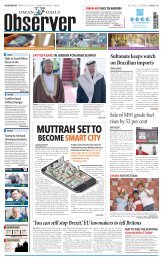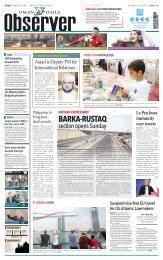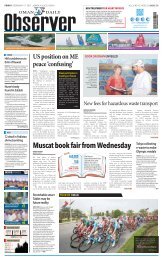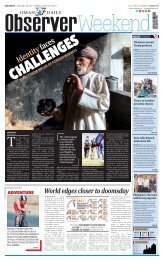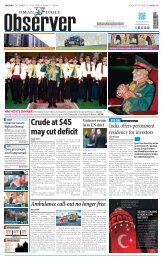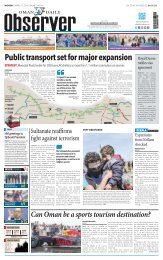GROWING
ICLt100AJRg
ICLt100AJRg
You also want an ePaper? Increase the reach of your titles
YUMPU automatically turns print PDFs into web optimized ePapers that Google loves.
6 REGION GO<br />
OMANDAILYOBSERVER SATURDAY l FEBRUARY 18 l 2017<br />
Turkish shelling kills<br />
nine in IS-held town<br />
BEIRUT: Nine civilians were<br />
killed in overnight Turkish<br />
bombardment of a militantheld<br />
town in northern Syria,<br />
a monitor said on Friday, but<br />
Ankara said the shelling killed 13<br />
“terrorists”.<br />
Three women were among<br />
those killed in the artillery fire on<br />
Al Bab, which Turkish-backed<br />
Syrian rebels have been fighting<br />
to take from the IS group, the<br />
Syrian Observatory for Human<br />
Rights said.<br />
“In the past 48 hours, Turkish<br />
air strikes and shelling have<br />
killed 45 civilians, including<br />
18 children and 14 women,”<br />
Observatory head Rami Abdel<br />
Rahman said.<br />
Turkey’s state-run Anadolu<br />
news agency said the army had<br />
hit dozens of IS positions, seven<br />
of them from the air.<br />
“In total, 13 IS terrorists were<br />
killed,” Anadolu reported.<br />
Ankara began military<br />
operations in Syria in August last<br />
year, targeting Kurdish fighters<br />
as well as IS, but says it is doing<br />
its utmost to avoid civilian<br />
casualties.<br />
Al Bab is IS’s last stronghold<br />
in Aleppo province and has<br />
come under fierce attack in<br />
recent months by Turkish forces<br />
and allied Syrian rebels.<br />
They entered the town last the<br />
weekend and are now engaged in<br />
“clean-up” operations, Turkish<br />
Defence Minister Fikri Isik said<br />
on Thursday.<br />
The Observatory, however,<br />
said Turkish forces had made<br />
little progress since entering the<br />
town from the west, and rebels<br />
said IS was putting up fierce<br />
resistance.<br />
Field commander Abu Jaafar<br />
said his forces had been able to<br />
overrun part of the town early<br />
on Thursday, but were then<br />
ambushed by IS.<br />
At least one militant<br />
suicide attacker wounded<br />
several rebels and seriously<br />
damaged their equipment, Abu<br />
Jaafar said.<br />
“Daesh seeks to install itself in<br />
civilian and public buildings and<br />
use civilians as human shields,”<br />
rebel spokesman Mahmud Hadi<br />
said on Friday.<br />
“They use suicide attacks<br />
and they move about through<br />
basements and tunnels...<br />
they infiltrate in between<br />
civilians fleeing the military<br />
operations to try and penetrate<br />
behind the lines of the rebel<br />
factions.”<br />
Dozens of civilians have been<br />
fleeing Al Bab on a daily basis,<br />
according to the Observatory,<br />
leaving newly liberated areas as<br />
well as escaping territory still<br />
under IS control.<br />
From outside the town on<br />
Friday, a line of fleeing residents<br />
could be seen crossing a field to<br />
escape the fighting, as gunshots<br />
sounded in the distance.<br />
On a road leading to the<br />
rebel-held town of Azaz, several<br />
fleeing residents had piled their<br />
belongings into carts on the back<br />
of motorbikes and were driving<br />
away. — AFP<br />
BONN: US allies said they had won<br />
assurances on Friday from new<br />
Secretary of State Rex Tillerson<br />
that Washington backed a political<br />
solution to the Syria conflict, ahead of<br />
UN peace talks.<br />
On the sidelines of a G20 gathering<br />
in Germany, Tillerson joined a group<br />
of countries who support the Syrian<br />
opposition for talks on a way to end<br />
the nearly six-year war.<br />
“All the participants want a political<br />
solution because a military solution<br />
alone won’t lead to peace in Syria,”<br />
German Foreign Minister Sigmar<br />
Gabriel told reporters in Bonn, adding<br />
that “Tillerson became very involved<br />
in the debates”.<br />
The meeting of the so-called<br />
“like-minded” nations — made up<br />
of around a dozen Western and Arab<br />
countries as well as Turkey — was the<br />
first since President Donald Trump<br />
took office.<br />
Diplomats had said before the talks<br />
that they were hoping for clarity on<br />
whether there had been a change in<br />
US policy on Syria, particularly on the<br />
future of President Bashar al Assad.<br />
The meeting came ahead of a<br />
new round of United Nations-led<br />
talks in Geneva on February 23<br />
involving Syrian regime and rebel<br />
representatives.<br />
Under Trump’s predecessor Barack<br />
Obama, Washington insisted Assad<br />
had to go, putting it at odds with<br />
Moscow which backs the Syrian<br />
leader. But Trump has called for closer<br />
cooperation with Moscow in the<br />
fight against the IS militants in Syria,<br />
downplaying what happens to Assad<br />
as secondary to US interests.<br />
With Russia’s sway in the conflict<br />
Allies claim US backing for<br />
political solution in Syria<br />
US Secretary of State Rex Tillerson (R), Turkish Foreign Minister Mevlut Cavusoglu (2nd R) and other diplomats listen to<br />
German Foreign Minister Sigmar Gabriel (3rd L) speaking during a meeting on Syria at the World Conference Centre in Bonn,<br />
western Germany, on Friday. — Reuters<br />
growing, Moscow has seized the<br />
initiative by hosting separate peace<br />
talks in Kazakhstan along with Turkey,<br />
to broker a fragile six-week truce<br />
between Syria’s warring parties.<br />
Gabriel said the “like-minded”<br />
countries had agreed to step up<br />
pressure on Russia to back a political<br />
solution, reaffirming that there could<br />
be no alternative to the UN-led Geneva<br />
talks. “Any political solution must<br />
be obtained in the framework of the<br />
Geneva negotiations and there should<br />
not be any parallel negotiations,” he<br />
said.<br />
Tillerson, on his first diplomatic<br />
trip abroad, has used the two-day G20<br />
event as a chance to sit down with a<br />
string of foreign counterparts unsure<br />
The meeting of the<br />
so-called “likeminded”<br />
nations —<br />
made up of around a<br />
dozen Western and<br />
Arab countries as well<br />
as Turkey — was the<br />
first since President<br />
Donald Trump took<br />
office<br />
about what Trump’s “America First”<br />
policy means for them.<br />
The former Exxonmobil boss on<br />
Friday held his first talks with Chinese<br />
counterpart Wang Yi, the highest level<br />
Sino-US encounter yet after the two<br />
powers got off to a rocky start under<br />
Trump.<br />
Trump angered Beijing by<br />
questioning the “One China” policy<br />
agreed in the 1970s as the basis for<br />
what has become one of the most<br />
important global relationships.<br />
Wang only agreed to go to Bonn<br />
after a conciliatory phone call between<br />
Trump and President Xi Jinping in<br />
which the US president backtracked<br />
on his earlier comments. Tillerson has<br />
also moved to reassure nervous allies<br />
with a cautious approach to Russia,<br />
signalling there would be no radical<br />
shift despite Trump’s pledges to seek a<br />
softer line. — AFP<br />
DEMO AGAINST SETTLEMENTS<br />
Germany says building more Israeli<br />
settlements may end 2-state solution<br />
Palestinians and foreigners march towards Israel’s controversial separation wall between the West Bank village of Bilin near<br />
Ramallah and the Israeli settlement of Modiin Ilit during a demonstration against settlements in the area, on Friday. — AFP<br />
BONN: Germany’s foreign minister<br />
has warned that building more<br />
Israeli settlements in the Palestinian<br />
territories could end the prospect of a<br />
two-state solution and fuel conflict in<br />
the region.<br />
Sigmar Gabriel’s comments came<br />
as conflicting statements by the<br />
new US administration threw off<br />
European allies who had hoped to<br />
get some clarity from Washington<br />
following US President Donald<br />
Trump’s apparent shift in policy on<br />
Wednesday regarding the Middle East<br />
peace process.<br />
“We are concerned that unlimited<br />
construction of settlements will...<br />
make a two-state solution impossible<br />
and could increase the risks of<br />
conflicts in the Middle East, including<br />
possible war,” Gabriel told reporters,<br />
showing Berlin’s growing frustration<br />
about settlement activity in the Israelioccupied<br />
West Bank.<br />
A vote by the Israeli Knesset to<br />
“legalise” settlements banned under<br />
international law further complicated<br />
the situation, Gabriel said during a<br />
news conference at a G20 foreign<br />
ministers meeting.<br />
Trump on Wednesday dropped<br />
a US commitment to a two-state<br />
solution to the Israeli-Palestinian<br />
conflict, abandoning a major pillar of<br />
US Middle East policy.<br />
But on Thursday, US Ambassador<br />
to the United Nations Nikki Haley<br />
said it would be wrong to say that<br />
Washington no longer supported a<br />
two-state solution.<br />
French Foreign Minister Jean-<br />
Marc Ayrault told reporters after a<br />
meeting with US Secretary of State<br />
Rex Tillerson that the US position<br />
on the Israeli-Palestinian dossier was<br />
“very confused and worrying”.<br />
Gabriel, who met with Tillerson<br />
later on Thursday, said Germany<br />
would continue to advocate a two-state<br />
solution for the Israeli-Palestinian<br />
conflict, calling it “the only realistic<br />
option to reduce conflict in the region<br />
and prevent the emergency of a new<br />
war”. — Reuters<br />
In ‘liberated’ Mosul, residents say danger remains<br />
MOSUL: The Iraqi forces that retook<br />
east Mosul from militants last month<br />
have moved on to their next battle,<br />
leaving a security vacuum that has<br />
residents complaining of a job halfdone.<br />
The traffic jams in the streets and<br />
the crowds swarming the shops of the<br />
eastern neighbourhoods that the IS<br />
group controlled only weeks ago are<br />
deceptive, residents say.<br />
“Everything looks like it’s back<br />
to normal but people know that<br />
bloodshed could be just around the<br />
corner and they live in constant fear,”<br />
said Omar, from a civil society group<br />
that has been trying to breathe life<br />
back into Iraq’s second city.<br />
“Everybody is talking about the<br />
liberation but Daesh (IS) is still here,”<br />
the 25-year-old said. “Their drones<br />
are flying above our heads, target<br />
our homes, our hospitals and our<br />
mosques.”<br />
The Joint Operations Command<br />
that has been coordinating Iraq’s fight<br />
back since IS seized a third of the<br />
country in 2014 announced that the<br />
east bank of Mosul had been “fully<br />
The traffic jams in<br />
the streets and the<br />
crowds swarming the<br />
shops of the eastern<br />
neighbourhoods<br />
that the IS group<br />
controlled only weeks<br />
ago are deceptive,<br />
residents say<br />
liberated” on January 24.<br />
The Iraqi tricolour has replaced IS’s<br />
black flag above official buildings but<br />
the atmosphere is tense.<br />
“The suicide car bombs are back<br />
and that brings back memories of<br />
Daesh,” said Umm Sameer, a resident<br />
of Al-Zuhoor neighbourhood.<br />
On February 9, a suicide bomber<br />
blew himself up at a popular restaurant<br />
in east Mosul, injuring several people,<br />
according to officials.<br />
Contrary to some expectations,<br />
roughly three-quarters of the<br />
People shop after returning to their homes in the Al-Zuhoor neighbourhood of<br />
Mosul. — Reuters<br />
population of east Mosul stayed<br />
home and weathered the fighting<br />
that engulfed their neighbourhoods<br />
when elite forces from the Counter-<br />
Terrorism Service (CTS) punched into<br />
the city to take on the militants.<br />
Yet some of them are leaving now,<br />
despite the fact that their areas have<br />
been officially liberated.<br />
Nuriya Bashir, in her sixties, left<br />
her home with her children and<br />
grandchildren this week.<br />
“My daughter’s husband was<br />
killed when a drone dropped a<br />
grenade. Daesh knew where he was<br />
that evening. The sleeper cells are<br />
everywhere,” she said, speaking from<br />
the Hasansham displacement camp<br />
east of Mosul where she and her family<br />
found shelter.<br />
“Just after the announcement<br />
that east Mosul was liberated, many<br />
displaced people left the camp to<br />
return to their homes,” said camp<br />
manager Rizqar Obeid.<br />
“But over the past few days, we<br />
have received around 40 families who<br />
couldn’t bear the situation in the city<br />
any longer,” he said.<br />
There are security forces deployed<br />
in east Mosul but Umm Sameer<br />
accused them of “negligence” in their<br />
work. CTS fighters have now moved<br />
out to prepare for an assault on the<br />
city’s west bank.<br />
“We have handed over this part of<br />
the city to the army,” Abdulwahab al<br />
Saadi, a top CTS commander, said.<br />
He admitted that insecurity<br />
remained in the east and blamed it on<br />
the fact that “militants on the west side<br />
continue to fire mortar rounds.”<br />
But weaponised drones and mortar<br />
fire are not the only security concerns<br />
for east Mosul residents.<br />
“The security shortcomings in<br />
east Mosul are obvious,” said Amer<br />
al Bek, an activist with a local civil<br />
society group, criticising “the lack of<br />
professionalism of some of the security<br />
forces.”<br />
Residents of four villages that lie<br />
just north of the city limits on the east<br />
bank of the Tigris have said that armed<br />
IS fighters are still in their midst.<br />
“There are around 100 of them<br />
in the area, walking around freely<br />
with their weapons and combat gear,”<br />
said one resident who would not<br />
give his name for fear of retribution,<br />
adding that the militants had recently<br />
executed several villagers.<br />
“Why is the army not liberating our<br />
villages,” another resident asked.<br />
In the city proper, the number of<br />
residents who stayed on during the<br />
fighting made effective screening<br />
almost impossible.<br />
The Institute for the Study of War<br />
said last week that the “inability to find<br />
a suitable hold force is also creating<br />
openings for IS to reinfiltrate, as shown<br />
by several attacks in eastern Mosul.”<br />
— AFP



